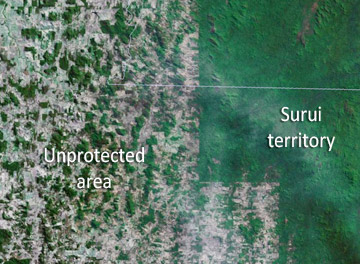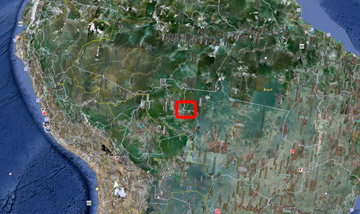An Amazon tribe has become the first indigenous group in the world’s largest rainforest to win certification of a forest carbon conservation project, potentially setting a precedent for other forest-dependent groups to seek compensation for safeguarding their native forests.
Today the Paiter-Surui, a tribe with 1300 members, announced their Surui Forest Carbon Project has been validated under both the Verified Carbon Standard (VCS) and Climate, Community and Biodiversity (CCB) Standard Gold, the dominant standards for accrediting projects that aim to reduce greenhouse gas emissions from deforestation and forest degradation, a concept known as REDD.
“Future generations also have the right to live, the right to have forests,” said Chief Almir Narayamoga Surui, the chief of the Paiter-Surui. “This project makes it possible for us to preserve the forest as providers of an ecosystem service.”
  The Surui have worked closely with Google to develop ways to map and monitor their territory which lies in the Brazilian state of Rondonia. See an Interactive Google Earth layer about the Surui tribe |
“This study confirms that we have the right to carbon, and is also an important political and legal instrument to recognize the rights of indigenous people for the carbon in their standing forests,” said Chief Almir Narayamoga Surui, leader of the Surui tribe. “It helps in our dialog with the government, businesses, and other sectors, strengthening the autonomy of indigenous peoples to manage our territories.”
The project is part of a broader 50-year plan by the Paiter-Surui to sustain their culture and steward their forests while boosting income for the tribe. For years the Paiter-Surui have battled to fight off encroachment by ranchers and illegal loggers. The landscape around the indigenous reserve has been mostly deforested.
Indigenous territories cover more than a fifth of the Brazilian Amazon, potentially making native tribes substantial beneficiaries of programs that pay landowners for avoiding deforestation. The Surui project has been seen as a test case on whether indigenous groups can actually derive real and substantial benefits from these programs. The project has established legal precedents for indigenous claims to carbon payments, served as a testing ground for advanced systems to measure forest carbon stocks, and explored approaches for distributing benefits throughout communities.
“This project can be a model for indigenous groups across Brazil,” said Divaldo Rezende, Environment Secretary for the Amazonian state of Tocantins, in a statement. “We’re watching it very closely in our state, and I know others are as well.”
According to the project validators, the initiative prevented as much as 205,000 tons of carbon dioxide from being emitted into the atmosphere from deforestation between 2009 and 2011. The credits are likely worth upwards of $1 million in the voluntary market. The Paiter-Surui expect to earn considerably more over the next 30 years — their territory covers 248,000 hectares, which of which would likely be deforested in coming decades without their protection and management efforts.
The certification of the Surui Forest Carbon Project is seen as a welcome development for supporters of REDD, which aims to compensate tropical countries for protecting forests but has been off to an inauspicious start due to an influx of unscrupulous project developers in some countries; controversies over safeguards, land rights, monitoring and verification, and the types of projects that qualify for payments; challenges in reforming the forestry sector; and complexities of devising the financial aspects of the mechanism. The Surui project has managed to avoid many of these pitfalls through multistakeholder engagement, careful planning, and the support of a wide range of organizations, including Forest Trends, the Amazon Conservation Team, Kaninde, the Institute for the Conservation and Sustainable Development of Amazonas (Idesam), and the Brazilian Biodiversity Fund (Funbio), and Google.
Related articles